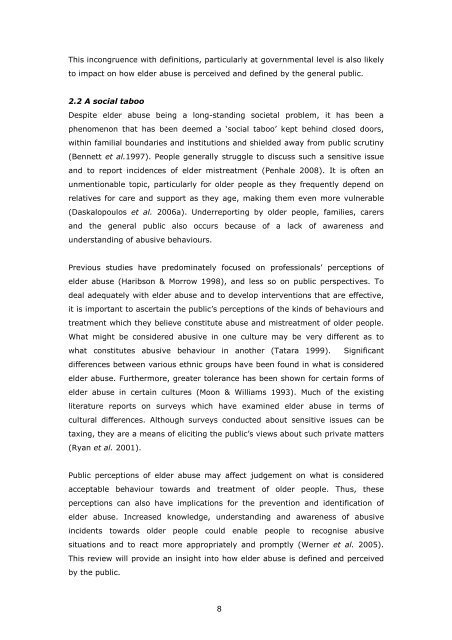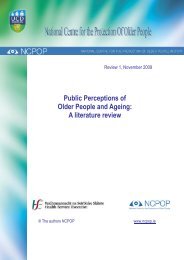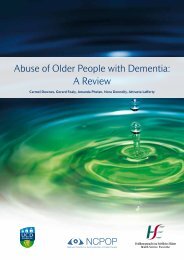Public Perceptions of Elder Abuse - Global Action on Aging
Public Perceptions of Elder Abuse - Global Action on Aging
Public Perceptions of Elder Abuse - Global Action on Aging
Create successful ePaper yourself
Turn your PDF publications into a flip-book with our unique Google optimized e-Paper software.
This inc<strong>on</strong>gruence with definiti<strong>on</strong>s, particularly at governmental level is also likely<br />
to impact <strong>on</strong> how elder abuse is perceived and defined by the general public.<br />
2.2 A social taboo<br />
Despite elder abuse being a l<strong>on</strong>g-standing societal problem, it has been a<br />
phenomen<strong>on</strong> that has been deemed a ‘social taboo’ kept behind closed doors,<br />
within familial boundaries and instituti<strong>on</strong>s and shielded away from public scrutiny<br />
(Bennett et al.1997). People generally struggle to discuss such a sensitive issue<br />
and to report incidences <str<strong>on</strong>g>of</str<strong>on</strong>g> elder mistreatment (Penhale 2008). It is <str<strong>on</strong>g>of</str<strong>on</strong>g>ten an<br />
unmenti<strong>on</strong>able topic, particularly for older people as they frequently depend <strong>on</strong><br />
relatives for care and support as they age, making them even more vulnerable<br />
(Daskalopoulos et al. 2006a). Underreporting by older people, families, carers<br />
and the general public also occurs because <str<strong>on</strong>g>of</str<strong>on</strong>g> a lack <str<strong>on</strong>g>of</str<strong>on</strong>g> awareness and<br />
understanding <str<strong>on</strong>g>of</str<strong>on</strong>g> abusive behaviours.<br />
Previous studies have predominately focused <strong>on</strong> pr<str<strong>on</strong>g>of</str<strong>on</strong>g>essi<strong>on</strong>als’ percepti<strong>on</strong>s <str<strong>on</strong>g>of</str<strong>on</strong>g><br />
elder abuse (Haribs<strong>on</strong> & Morrow 1998), and less so <strong>on</strong> public perspectives. To<br />
deal adequately with elder abuse and to develop interventi<strong>on</strong>s that are effective,<br />
it is important to ascertain the public’s percepti<strong>on</strong>s <str<strong>on</strong>g>of</str<strong>on</strong>g> the kinds <str<strong>on</strong>g>of</str<strong>on</strong>g> behaviours and<br />
treatment which they believe c<strong>on</strong>stitute abuse and mistreatment <str<strong>on</strong>g>of</str<strong>on</strong>g> older people.<br />
What might be c<strong>on</strong>sidered abusive in <strong>on</strong>e culture may be very different as to<br />
what c<strong>on</strong>stitutes abusive behaviour in another (Tatara 1999). Significant<br />
differences between various ethnic groups have been found in what is c<strong>on</strong>sidered<br />
elder abuse. Furthermore, greater tolerance has been shown for certain forms <str<strong>on</strong>g>of</str<strong>on</strong>g><br />
elder abuse in certain cultures (Mo<strong>on</strong> & Williams 1993). Much <str<strong>on</strong>g>of</str<strong>on</strong>g> the existing<br />
literature reports <strong>on</strong> surveys which have examined elder abuse in terms <str<strong>on</strong>g>of</str<strong>on</strong>g><br />
cultural differences. Although surveys c<strong>on</strong>ducted about sensitive issues can be<br />
taxing, they are a means <str<strong>on</strong>g>of</str<strong>on</strong>g> eliciting the public’s views about such private matters<br />
(Ryan et al. 2001).<br />
<str<strong>on</strong>g>Public</str<strong>on</strong>g> percepti<strong>on</strong>s <str<strong>on</strong>g>of</str<strong>on</strong>g> elder abuse may affect judgement <strong>on</strong> what is c<strong>on</strong>sidered<br />
acceptable behaviour towards and treatment <str<strong>on</strong>g>of</str<strong>on</strong>g> older people. Thus, these<br />
percepti<strong>on</strong>s can also have implicati<strong>on</strong>s for the preventi<strong>on</strong> and identificati<strong>on</strong> <str<strong>on</strong>g>of</str<strong>on</strong>g><br />
elder abuse. Increased knowledge, understanding and awareness <str<strong>on</strong>g>of</str<strong>on</strong>g> abusive<br />
incidents towards older people could enable people to recognise abusive<br />
situati<strong>on</strong>s and to react more appropriately and promptly (Werner et al. 2005).<br />
This review will provide an insight into how elder abuse is defined and perceived<br />
by the public.<br />
8









